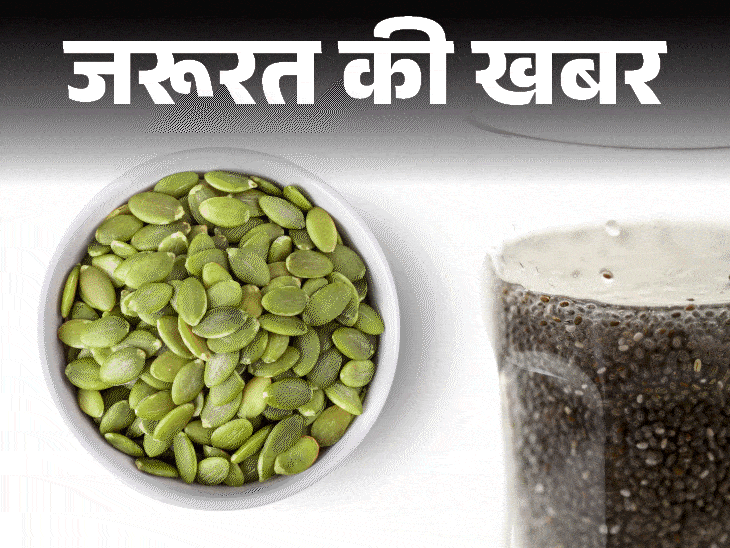winter As soon as the rainy season arrives, many health-related problems increase. It affects our lungs. Coughs, colds, asthma and breathing problems are common with colds.
In cold weather, dry air, pollen particles and viral infections can damage the lungs. Because of this, health problems such as shortness of breath, cough and fever may occur. In such a situation, it is important that we take care of our lungs.
In such a situation, today, in the news of need, we will know about some of these super seeds, which can act as a protective shield for our lungs during the cold season. You will also learn that-
What effect does cold have on the lungs? How to avoid it? What are the benefits of seeds? How to eat them?
Question – Why is the cold more sensitive to our lungs?
Answer – Due to lack of sunlight in winter, there is a deficiency of vitamin D in the body. As a result, the body’s immune system weakens. Due to lack of humidity and air pollution, the lungs become more susceptible to infections. Cold air causes the airways in the lungs to narrow and swell. As a result, there is difficulty in breathing.
Question – How to take care of your lungs in cold weather?
Answer: In cold weather, it is important to wear warm clothing, drink enough water, and stay hydrated. Use a mask to avoid pollution, go out only when necessary. To maintain strong immunity, eat superfoods like chia seeds and flax seeds.
Pranayama and deep breathing practice also keep the lungs strong. With the use of a heater, the humidity present in the air is lost. In such a situation, use it in a limited manner. By taking a few precautions like this, you can take care of your lungs in winter.
Question: Why is it advisable to eat seeds to increase immunity in winter?
Answer – Seeds are rich in nutrients that strengthen the immune system. The seeds contain high amounts of antioxidants, omega-3 fatty acids, fiber, protein, vitamins and minerals that strengthen the immune system.
The seeds protect the body from infections. In cold weather, when the risk of infection is high, the seeds help keep the body strong from the inside.
Question: What seeds should be included in the diet?
Answer – Seeds provide essential nutrients to the body. Protects against infections and helps maintain lung health. Let’s understand these super seeds through a graph.
Question: How is consuming these seeds beneficial for the lungs?
Answer – Flax, chia, pumpkin, sunflower, basil and watermelon seeds contain nutrients that benefit lung health in several ways.
Question: What are the other health benefits of seeds?
Answer – Seeds contain many nutrients that benefit the body in several ways. Let us know about some important seeds and their health benefits.
Benefits of flax seeds (alsi)
Heart Health: Flaxseeds contain omega-3 fatty acids, which help maintain heart health.
Improves digestion: They contain fiber, which improves digestion and reduces constipation.
Useful for weight loss: These seeds help control appetite, which helps in weight loss.
What we find: Omega-3, fiber, protein, vitamin B1, lignans.
Benefits of chia seeds (Sabja)
Cholesterol: Chia seeds contain omega-3 fatty acids and fiber, which help control blood pressure and cholesterol.
Bone strength: Bones become strong thanks to the presence of calcium, magnesium and phosphorus.
Anti-inflammatory: These seeds have anti-inflammatory properties, which reduce inflammation.
What we find: Omega-3, fiber, protein, calcium, antioxidants.
Benefits of Pumpkin Seeds
Protein and zinc: Pumpkin seeds contain protein and zinc, which strengthen the body’s immune system.
Improves sleep: They contain an element called tryptophan, which helps you sleep better.
Blood Pressure Control: Helps control cholesterol and blood pressure.
What we find: Zinc, Magnesium, Proteins, Omega-3, Tryptophan.
Benefits of sunflower seeds
Beneficial for the skin: contains vitamin E, brightens the skin and slows down the signs of aging.
Immunity: Vitamin E and selenium strengthen the immune system.
Rich in antioxidants: These seeds protect the body from free radicals.
What we find: Vitamin E, Selenium, Proteins, Phosphorus.
Benefits of Basil Seeds (Tulsi Seeds)
Anti-inflammatory properties: Basil seeds help reduce inflammation.
Hormonal Balance: These seeds help correct hormonal imbalance in women.
Coolness: Eating this keeps the body cool, which provides relief in summer.
What we find: Omega-3, fiber, antioxidants, calcium.
Benefits of Watermelon Seeds
Source of Protein: Watermelon seeds contain protein, which helps build muscles.
Heart Health: These seeds help maintain heart health.
Aids in digestion: These seeds are useful in improving digestion.
What we find: Protein, Magnesium, Vitamin B, Zinc.
Question: How should the seeds be consumed? By soaking, grinding, roasting or in any other form?
Answer: There are different ways to eat seeds. Eating soaked flax and chia seeds is beneficial. As a result, fiber and nutrients are easily absorbed. Sunflower and pumpkin seeds can be eaten by lightly roasting them, which enhances their taste and makes them delicious as snacks. Flax and chia seeds can also be consumed by grinding them, so that the nutrients can be completely absorbed by the body. The seeds can also be added to curd, salad or smoothie.
……………
Cold or cough are more common during the winter season. To avoid this, people adopt various methods, while some of these things are available in our kitchen itself.

